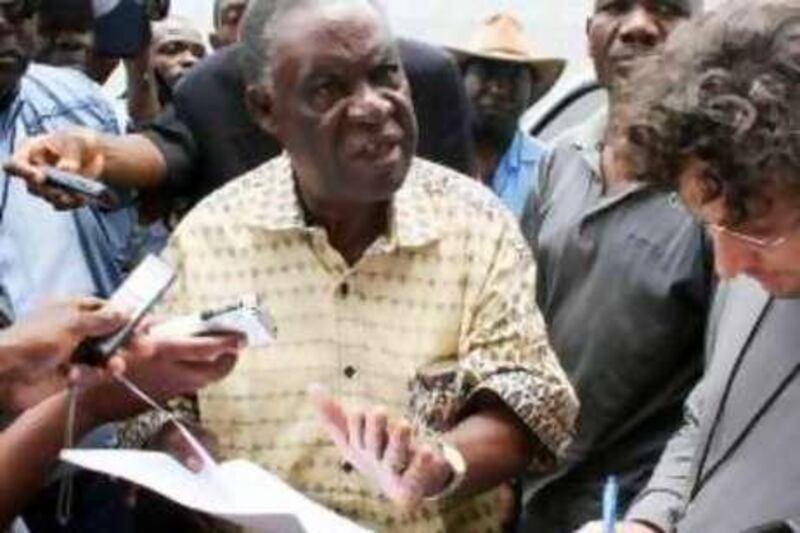LUSAKA // "Who was the Roman historian who said there is always something new out of Africa?" asked Guy Scott, vice president of Zambia's opposition Patriotic Front. "There's always a new way to rig an election in Africa." The copper-rich country - something of an investors' and donors' darling in recent years under the leadership of the late Levy Mwanawasa, who pursued foreign investment and proclaimed an anti-corruption policy - went to the polls last week to choose his successor after he died of a stroke. In an extraordinarily close race, Michael Sata, the firebrand leader of the opposition, who is known as "King Cobra" for his combative style, took a huge early lead that was slowly whittled away by Rupiah Banda, the candidate of Mr Mwanawasa's Movement for Multi-Party Democracy (MMD), until he overtook him as the last few constituencies were announced, winning in the end by a mere 35,209 votes out of nearly 1.8 million cast. There were two other candidates. He was sworn in as president yesterday afternoon. "I declare today that I will maintain and uphold the constitution and laws of Zambia, so help me God," he said as he took the oath of office in Lusaka. The opposition is crying foul, citing a litany of complaints, although observer missions from the African Union and the regional Southern African Development Community endorsed the voting as free and fair. As far as the counting was concerned, Stanley M'Hango, the president of the independent Foundation for the Democratic Process, a Zambian monitoring group that carried out a parallel tabulation, said: "We are satisfied with the results that have actually come out. There are no big variations there to cause concern for us." None of that dampens the opposition's anger, and the exercise has proved to be an illustration of how easily perceptions can be manipulated. Mr Sata's power base is concentrated among the urban poor, whose constituencies are always the earliest to declare, given the better infrastructure of towns and cities. When the first batch of results were announced at the Mulungushi International Conference Centre in Lusaka he was leading by a two-to-one margin. But as tallies slowly trickled in over three days from the rural areas that are Mr Banda's strongholds, some of them deeply remote - there are constituencies that are more than 400km long and with dire communications - Mr Sata's advantage was steadily cut back until the MMD finally went in front. "It's happening at the very last minute," a western diplomat said. "For the common Zambian, it's not easy to understand." The Patriotic Front sought to make as much of the situation as it could. At one point, Mr Sata stormed into the results centre to denounce the Electoral Commission of Zambia (ECZ) as "criminals", brandishing a list of figures he said proved the electoral register had been expanded. "Wherever they are saying Rupiah Banda is catching up they are using this inflated voters' roll," he said. "There's no stronghold," he insisted, in clear defiance of the facts. "You only accept if you are defeated, there's no way Mr Banda can defeat me. The way he must defeat me is freely, not by corruption." It later emerged that all the parties, including the Patriotic Front, had long been aware that corrections had been made to the lists after the last polls in 2006. Mr Sata's message nonetheless resonates among his supporters. "If they try to say Banda has won there will be chaos," said one middle-aged man in Kanyama, a slum in the capital, as the final declarations approached. The Patriotic Front demanded that the results announcements be stopped, declaring that there was "clear evidence of irregular alteration of results going on in the closing stages of the counting and reporting". Given Lubinda, its portentous spokesman, said it would challenge the results in court, adding: "The Patriotic Front will not recognise Mr Banda as having been elected by the free will of the Zambian people". Some of the party's complaints may be worthy of investigation, while others - such as claims of a fix after an MMD spokesman predicted the ruling party would win by 62,000 votes - appear to be entirely spurious. Both the MMD and ECZ deny any wrongdoing, and the observer groups' verdicts suggest the election was largely clean. Nonetheless, the authorities have created circumstances that encourage suspicion. No new voter registration exercise was conducted, meaning that all those who had turned 18 in the two years since the last vote - many of them likely Sata supporters - were disenfranchised. An extra 600,000 ballot papers were printed, raising doubts about their purpose and what would happen to them, and delays in announcing results from areas close to the capital prompt questions about the process. "Arithmetic is not well taught in African schools," said Mr Scott, who was once an engineering lecturer and the "token male" at the then all-female Somerville College of Oxford University. "It doesn't constitute one of the strengths for which the continent is famous." The vast distances and widely spread population of Zambia created opportunities for fixing the vote, he said. "There's a book called 101 ways to rig an election. I have realised it's a misprint, it should have been 1,001. "These kinds of narrow margins are a giveaway," he said. "I think they keep a lot of the boondocks in reserve. They don't pick up the boxes until they know how many they need." It is impossible to say with absolute certainty whether his party is a paranoid, a sore loser or the victim of a travesty of electoral justice. And both sides will probably still be arguing their cases until the next vote in 2011. sberger@thenational.ae
Zambia's defeated opposition cries foul
Observers have endorsed Zambia's election as free and fair, but the Patriotic Front, which lost by a narrow margin, claim it was rigged.

Editor's picks
More from the national




